New World Embassy—Kurdistan
September 23–24, 2023
Le Signal L, Plateforme 10, Lausanne
Supported by Progressive International.
With contributions by: Nilüfer Koç, Necîbe Qeredaxî, David Adler, Elisabeth Decrey Warner, Varsha Gandikota, Fatima Ouassak, Rojîn Mûkrîyan, Ahmedna Abdi M’barek, Marwa Arsanios, Rohash Shexo, Nazma Akter, Stefanie Prezioso, Margarita Tsomou and Chris Keulemans.
See all diplomatic circles in Kurdish, French and English.
New World Embassy: Kurdistan is a project by Nilüfer Koç of the Kurdistan National Congress (KNK) and artist Jonas Staal, which took the form of a large-scale installation that operated for two consecutive days as an alternative embassy for the Kurdish peoples, which today find themselves under occupation of four different nation-states: Bakûr (North-Kurdistan, Turkey), Rojhilat (East-Kurdistan, Iran), Başȗr (South-Kurdistan, Iraq) and Rojava (West- Kurdistan, Syria).
The separation of historical Kurdistan can be traced back, in part, to the 1923 Treaty of Lausanne that was signed in Switzerland, which granted a majority of the Kurdish homeland to modern Turkey. Erecting this “stateless embassy” in Lausanne confronted this historical injustice one hundred years later, but also represented the alternative ideas of self-determination the Kurdish peoples developed in response to their occupation and separation. Revolutionary Abdullah Öcalan’s vision of a” stateless democracy” for example, that critiques the patriarchal, nationalist and capitalist mentality of statehood, is today being practiced across different parts of Kurdistan, and can be considered an essential alternative to the crises of the interstate system.
Just as the Kurds have envisioned a “stateless democracy” so this embassy operated as a “stateless embassy.” It prioritized people’s diplomacy—cultural diplomacy—over state diplomacy, and gathered representatives from the different parts of Kurdistan, together with progressive politicians, Indigenous peoples, solidarity movements and cultural workers of all kinds. Together they discussed and imagined with the public what it means to separate the practice of democracy from the state, the meaning of stateless decoloniality, the necessity of cultures of solidarity, and the possibility and practice of stateless world democracy.
As our geopolitics is increasingly turning into a tragic theater, New World Embassy: Kurdistan instead transformed the theater into a site to imagine and practice a new planetary democratic politics.





